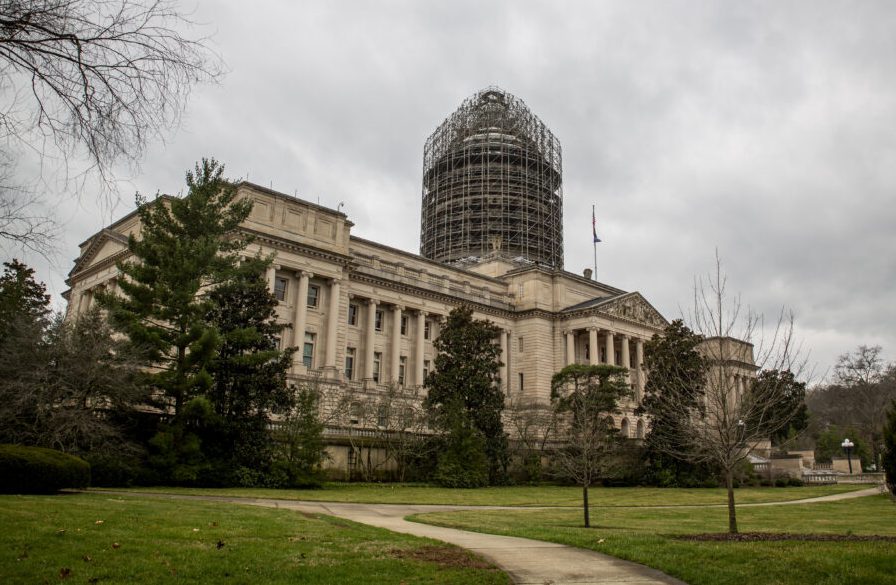
FRANKFORT, Ky. — When the legendary Allan Trout was chief of The Courier-Journal’s Frankfort Bureau, he liked to work up “trial balances” on governors and legislatures, evaluating their performances in progress. With two days left in the 2024 General Assembly, largely to reconsider bills Gov. Andy Beshear vetoes, here’s a ledger on the current General Assembly.
Economic conservatives will be pleased that the budget for the two years beginning July 1 keeps the state on track to reduce and perhaps eliminate its income tax, by maintaining a huge surplus. Economic liberals will be disappointed that the state isn’t using those billions to make pre-kindergarten classes universal in a state that still lags in education and, as a result, income.
Social conservatives will be pleased that the legislature is trying again to open the door to public support for private schools, an idea that barely overcame rural resistance in the legislature then ran into a buzzsaw in the courts. Their ultimate solution, an amendment to change the state Constitution, will be on the Nov. 5 ballot.
That doesn’t please social liberals, or rural conservatives who hold public education in high regard, but there’s merit in letting voters decide the issue — unless the referendum question becomes warped by the millions of dollars likely to be spent by both sides.
The ballot will have at least one other amendment, which is completely unnecessary — except for Republicans who run the show and want to generate voter turnout from an ardent part of their base. It would ban non-citizens from voting, which is not a thing. Unless you’re trying to appeal to suspicion, ignorance and hatred of immigrants.
The ballot could still get two more amendments, because they bypass the governor, but it seems unlikely. The House didn’t like the Senate’s idea of moving elections of statewide constitutional officers to presidential election years, which would help Republicans but disadvantage House members, who can now seek those offices without giving up their seats. And there seems to be no sentiment in the House to curb the governor’s pardon powers, another Senate-passed idea of Sen. Chris McDaniel of Kenton County.
Republican politics in Frankfort ruled in passage of bills aimed at Louisville, the biggest blue island in our red state. Republicans struggle in Metro Council and mayoral elections, so they’re making them nonpartisan — and keeping the current council from changing land-use ordinances for a year, among other things. They hate the teachers’ union, which has its biggest local in Louisville, and they’re unhappy with the Jefferson County Public Schools, so they’re starting a study of breaking up the district.
Several other bad ideas died.
When the House decided to eliminate diversity, equity and inclusion programs at state universities, the door to compromise was slammed by the Senate, which had passed a bill that would’ve done little more than ban things that aren’t going on anyway. It’s hard to imagine the two chambers agreeing in the veto session on something Beshear would accept.
When the Senate narrowly voted to transfer the Department of Fish and Wildlife Resources to the state Department of Agriculture, over the objections of hunters and fishers who fund the agency, the House listened and killed the bill. The best sign this was a bad idea is that it was introduced late, perhaps in an attempt to short-circuit constituents’ objections.
You could say much the same about the bill to create a new agency to oversee horse racing and charitable gaming, which passed in the minimum three days at the end of the session. Charitable-gaming interests seemed to be caught flat-footed, which horse-racing interests never seem to be. That’s always been true, but now the industry has two of its own in power: Senate Floor Leader Damon Thayer and House Speaker David Osborne. Is this a bad idea like those above? It’s hard to say. In racing terms, it has not been well vetted — except among those who agree on it.
Still hanging fire is a bill that would badly weaken the state Open Records Act, by exempting from it messages on government officials’ personal electronic devices. Now, those messages are subject to disclosure if they involve government business. The House, and then a Senate committee, rejected language that would have exempted many officials and agencies from the law.
The bill is on the Senate floor, so it could still pass, but to become law it would have to be acceptable to Beshear. His office worked on parts of the bill, and he endorsed the current version, so perhaps the Senate wants to spotlight it and make sure that he shares the credit and/or the blame for it. They’d better just forget it; this one could blow up in their faces in Frankfort. Sooner or later, voters are going to get tired of officials running the public’s business like personal business.
Al Cross (@ruralj) is a professor in the University of Kentucky School of Journalism and Media and director emeritus of its Institute for Rural Journalism. He joined the Kentucky Journalism Hall of Fame in 2010. Republished from the Northern Kentucky Tribune, a nonprofit publication of the Kentucky Center for Public Service Journalism.



















